
Someone close to me has an issue with hypothyroidism. Even though she takes medicine, there are some days when she doesn’t feel well at all. She gains weight easily, and it’s difficult for her to lose it again. She often feels cold, lethargic, and depressed.
This is common in people with hypothyroidism. Thankfully, good nutrition can back up the support that medicine provides, so people can feel better. The 12 best foods to eat for hypothyroidism contain nutrients like selenium, iodine, glutamine, and tyrosine, which directly support thyroid function. They also provide fiber, vitamins, and other trace minerals to indirectly impact the health of the thyroid.
I’m sharing my list of the best hypothyroidism diet foods here. At the end of the list, I’ll include three meal ideas to help you bring these foods into your daily menu.
12 Delicious Foods To Eat For Hypothyroidism (With Pictures!)
Salmon
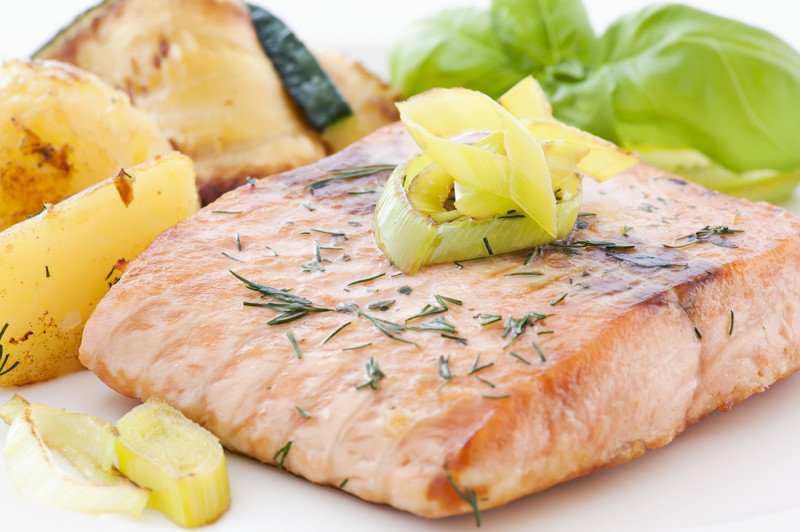
Salmon is great for hypothyroidism partly because it’s seafood. Like most items from the sea, salmon is rich in iodine, which is necessary for the proper function of the thyroid. Salmon is also one of the best foods to eat for omega-3 fatty acids, which have several health benefits. Omega-3 fatty acids support healthy cognitive function, prevent heart disease, and are great for the eyes.
One of the best things about omega-3 fatty acids is that they have strong anti-inflammatory properties. Inflammation can promote thyroid problems, so finding any way to settle that inflammation down is wonderful for thyroid health.
Salmon also contains vitamin D. Some sources indicate that vitamin D supplementation can improve some markers for thyroid health. One small salmon fillet provides 116% of the daily recommendation for vitamin D.
Brazil Nuts

Brazil Nuts are rich in a trace mineral called selenium, which is excellent for thyroid health. Most of the selenium in the body is found in the thyroid. Selenium is interesting because it acts as a strong antioxidant, so it protects the thyroid.
Brazil nuts are extremely rich in selenium. One ounce of Brazil nuts provides 988% of the daily recommendation for selenium.
Brazil nuts are also a good source of B vitamins, vitamin E, magnesium, and zinc.
Blueberries

Blueberries are a superfood for a variety of reasons. They’re rich in vitamin C and other vitamins, as well as fiber and water. When it comes to weight loss, which people with hypothyroidism can struggle with, blueberries are a star because they affect the genes the tell your body whether to store fat or release it. Blueberries are also related to reduced abdominal fat.
Blueberries also support a healthy thyroid. This is mostly due to the high levels of antioxidants that blueberries contain. Blueberries and other dark berries, like cranberries and raspberries, contain pigments called anthocyanins that are powerful antioxidants. Anthocyanins are great for eye health, but their strong antioxidant properties can also support healthy thyroid function.
Eggs
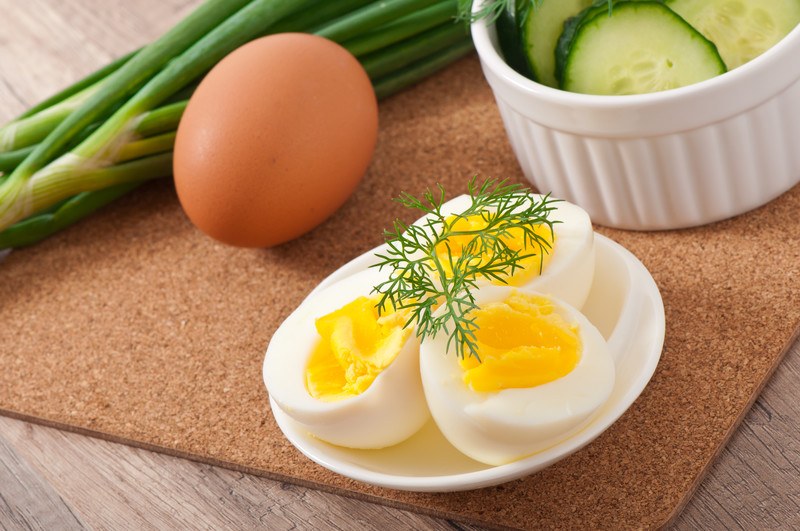
When it comes to thyroid health, eggs are a well-rounded choice. The yolks contain both selenium and iodine. One raw egg provides 28% of the daily recommendation for selenium.
One interesting thing about hypothyroidism is that it’s often associated with a vitamin B12 deficiency, which eggs are a good source of. One egg provides 19% of the daily recommendation for vitamin B12 and 18% for riboflavin. Riboflavin is sensitive to thyroid hormones, and some animal studies indicate that riboflavin deficiency is also associated with hypothyroidism.
Eggs are also one of the best food sources for a compound called choline. Hypothyroidism negatively affects choline function in the brain. It’s possible that getting enough choline by eating eggs could help.
Yogurt
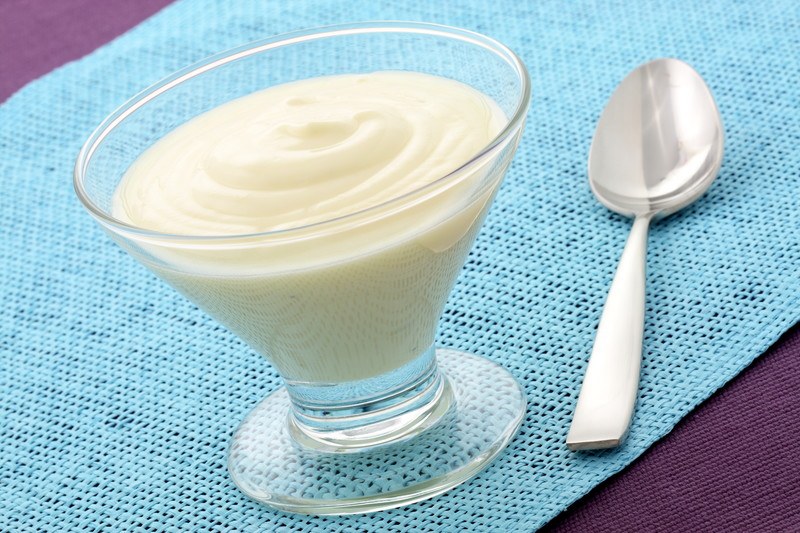
There’s a link between a healthy gut microbiome and a healthy thyroid. Having a healthy digestive system allows you to absorb iodine and other nutrients that are important for thyroid health. Yogurt provides probiotic bacteria, such as Lactobacillus Acidophilus and Bifidobacterium, which help to restore gut health.
At the same time, yogurt also provides selenium, calcium, and other nutrients that support thyroid health. One container of nonfat, plain Greek yogurt contains 30% of the daily recommendation for selenium, as well as 14% for calcium, 53% for vitamin B12, and 36% for riboflavin. Small containers of yogurt make an easy breakfast and a great addition to take-along lunches.
Brown Rice

Brown rice contains fiber, minerals, and vitamins that support thyroid function. The fiber in brown rice helps build a healthy gut microbiome.
Brown rice is impressively rich in a trace mineral called manganese. Although manganese is toxic at high levels, getting enough is important, too. Manganese is needed to help several types of enzymes throughout the body to work, and a manganese deficiency can reduce thyroid health. One cup of cooked brown rice provides 93% of the daily recommendation for manganese.
Brown rice is also rich in pantothenic acid, which is sometimes used as a supplement to take the edge off of thyroid treatment. A cup of cooked brown rice contains 15% of the daily recommendation for pantothenic acid.
Pomegranate
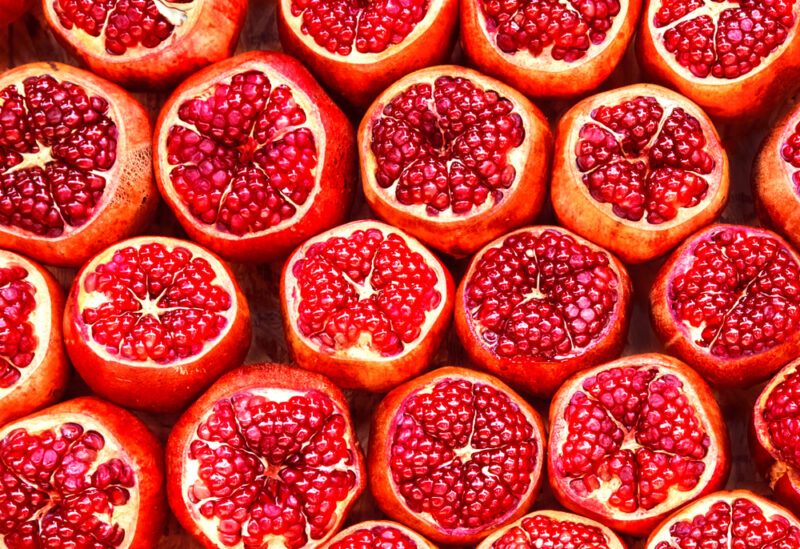
Like blueberries, pomegranates are rich in antioxidants, which are necessary for thyroid health. This could be due to their dark color, which comes from anthocyanins. Anthocyanins provide the potent antioxidant effects of pomegranate fruits.
Pomegranate fruit is also a great source of other nutrients that support thyroid health. Half a cup of pomegranate seeds provides 12% of the daily recommendation for fiber, which helps build gut health. It also contains 10% of the daily recommendation for vitamin C, which has antioxidant and anti-inflammatory properties, too. Other nutrients that pomegranates are rich in include pantothenic acid, several other B vitamins, potassium, selenium, and zinc.
Asparagus

When it comes to thyroid health, asparagus is important because it contains iodine, which is necessary for the creation of the thyroid hormones, thyroxine, and triiodothyronine. It’s also a fiber-packed food, with 10% of the daily recommendation for fiber in a one-up serving.
Asparagus is rich in other thyroid-supporting nutrients, too. This includes riboflavin, pantothenic acid, and selenium.
Asparagus also provides antioxidant properties. It contains vitamins E and C, as well as compounds such as glutathione and quercetin. Besides antioxidant properties, many of these compounds also act as anti-inflammatory agents. Some could help fight cancer, as well.
Sunflower Seeds

Like Brazil nuts and yogurt, sunflower seeds are rich in selenium. This is necessary for thyroid health, not only for its antioxidant effects but because selenium is needed to help thyroid hormones work properly. One ounce of sunflower seeds provides 44% of the daily recommendation for selenium, as well as 9% for fiber.
Sunflower seeds are also a rich source of riboflavin, pantothenic acid, vitamin B6, selenium, and several other minerals and vitamins.
There’s one other very interesting nutrient that sunflower seeds provide, and that’s vitamin E. An ounce of sunflower seeds contains 44% of the daily recommendation for vitamin E. Vitamin E is important for thyroid health because people with hypothyroid issues are often low in vitamin E. Vitamin E also acts as an antioxidant.
Sesame Seeds

Copper and zinc are both important for thyroid function, and sesame seeds contain both of those minerals. An ounce of sesame seeds provides 44% of the daily recommendation for copper and 17% for zinc, as well as 18% for selenium, 10% for iron, and 24% for magnesium.
Besides minerals, sesame seeds contain folate, several B vitamins, vitamin E, and fiber. An ounce of sesame seeds contains 12% of the daily recommendation for fiber.
One interesting thing to note is that there are both black and white sesame seeds, and their oils have health properties, too. Some sources indicate that the oil from black sesame seeds has antibacterial properties that could fight microorganisms that, in some cases, infect the thyroid and cause hypothyroidism.
Seaweed
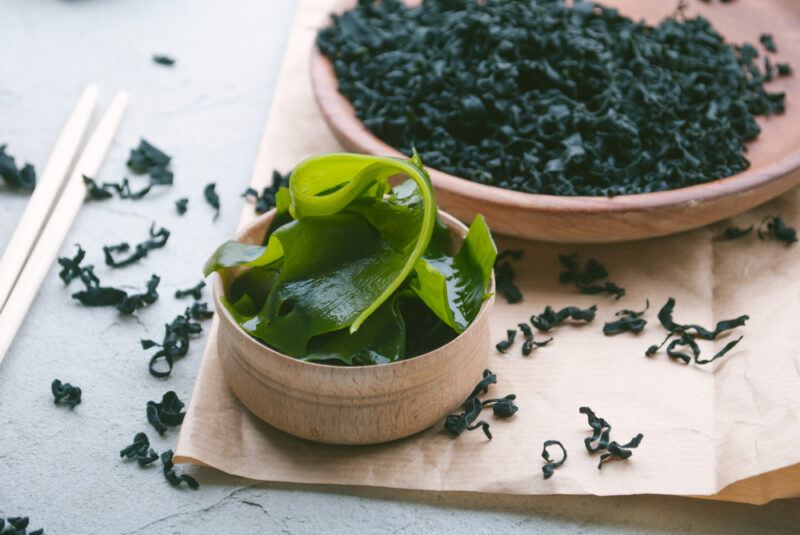
Like salmon, seaweed comes from the oceans and is rich in iodine. There are several types of edible seaweed that are good for the thyroid. Seaweeds come in red, brown, and green colors.
Fucus is a type of kelp or brown seaweed, that is known for being helpful for treating thyroid issues, although other types of seaweed are rich in iodine, too.
Besides iodine, fucus and other seaweed types contain fiber and several trace minerals that could impact the thyroid and overall body health. For example, fucus provides compounds containing potassium, magnesium, calcium, and iron, as well as a compound called alginic acid. Alginic acid is interesting because it helps bind heavy metals so they can be more easily moved out of the body. This is helpful for people with hypothyroidism because some heavy metals could disrupt a healthy thyroid function.
Lean Beef

People with hypothyroidism need to be careful about the types of meat they eat, but sometimes lean beef is a good choice. This is because some of the amino acids it contains are necessary for rebuilding thyroid health. This includes glutamine, which protects against oxidation and inflammation, boosts the immune system, and aids in detoxification.
Tyrosine is another amino acid that’s necessary for proper thyroid function. It combines with iodine to form a thyroid hormone. However, supplementing with tyrosine could make hypothyroidism worse, so it’s best to get it from a nutritious whole food source like lean beef.
One four-ounce serving of 97% lean ground beef provides both tyrosine and glutamic acid, a precursor to glutamine, which is formed in the body. This serving size also contains 106% of the daily recommendation for vitamin B12, 13% for riboflavin, 36% for selenium, and 54% for zinc.
Three Meal Ideas To Boost Thyroid Function

Now that you’ve read through the list of the 12 best foods to eat for hypothyroidism, let’s talk about some food combinations that you could use to get started with your hypothyroidism diet immediately. These combinations are common-sense solutions that are easy to build an eating plan around.
Meal idea #1: Steak And Eggs
Steak and eggs are often served together as a breakfast meal in some areas of the world. This meal has plenty of protein to carry through the day, as well as tyrosine and selenium to promote a healthy thyroid.
Meal idea #2: Yogurt With Blueberries
Yogurt with blueberries can be eaten as a light breakfast or a healthy snack later during the day. The yogurt provides selenium and probiotic bacteria for building gut health. The blueberries are packed with vitamins and antioxidants to help support a healthy thyroid.
Meal idea #3: Salmon With Brown Rice And Asparagus
Salmon provides plenty of iodine, while brown rice and asparagus contain other minerals and fiber to help treat hypothyroidism and rebuild thyroid health.



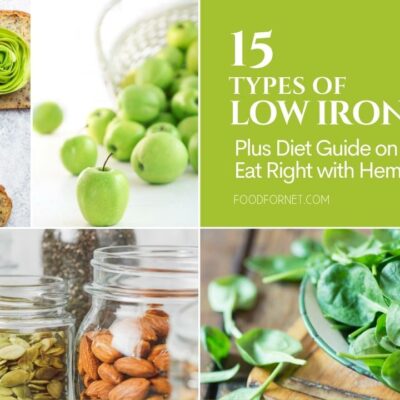








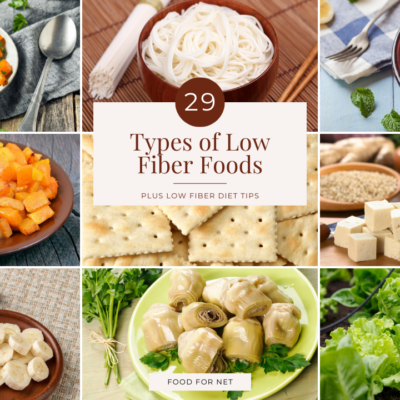
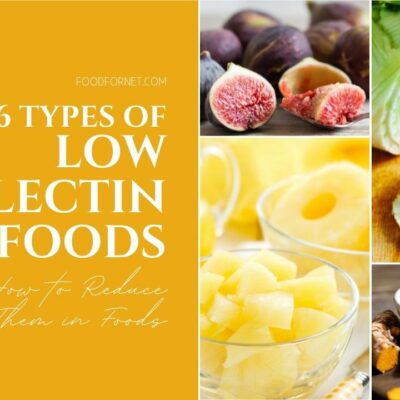



 5 Best Plant-Based Collagen Brands
5 Best Plant-Based Collagen Brands
Thank you very much for all your information on hypothyroidism.